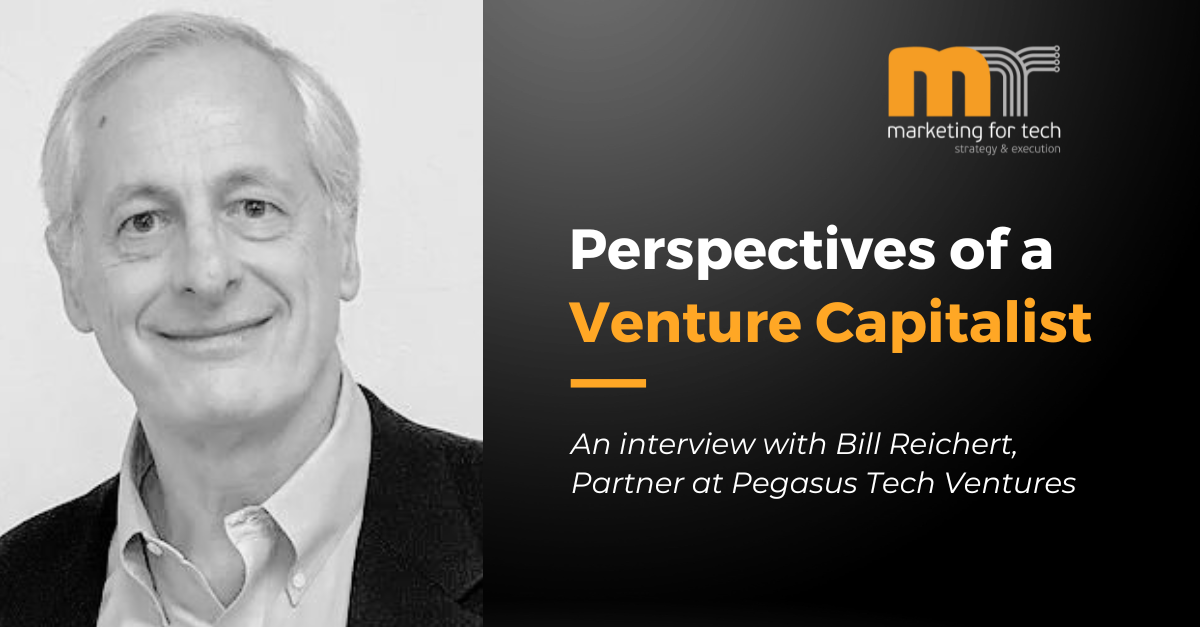Perspectives of a Venture Capitalist
An interview with Bill Reichert, Partner at Pegasus Tech Ventures

Bill Reichert is a Partner at Pegasus Tech Ventures, a global venture capital firm with headquarters in Silicon Valley. He is also the Chief Evangelist for Startup World Cup, a platform that connects and supports startup ecosystems all over the world. We chatted with Bill to get his perspectives as a venture capitalist and advice on entrepreneurship.
What makes a technology start-up fundable? What do VCs look for?
Many entrepreneurs are fascinated with their product and technology, but they fail to understand what the investors care about. What makes an entrepreneur fundable is the ability to convince investors that you can deliver a unique value proposition to customers, and get paid for it, and scale the company to a level that will enable the investor to get 10x of our money back. So, what we look for is validation of the value proposition and evidence that the team can execute.
It is not good enough to have a great pitch deck or a really good product. You have to stand out from the rest of the crowd. How do you stand out? You have to clearly state what it is that you are doing. It is amazing to us how few entrepreneurs are actually good at this. Give investors some evidence that someone other than you believes in this value proposition that you are asserting. Ideally, you already have some customers or some evidence from third parties that gives investors confidence that what you are saying is true. So, be clear, be compelling, and be credible in order to stand out.
How can founders find the right investor for their company? What is the secret to getting the attention of a VC?
The secret to choosing the right investor is pitching to the right investor and getting your pitch right for that investor. To find the right investor, you have to do your research and become a networking superstar. Research investors who are relevant to your company in terms of sector, stage, geography, and related investments.
Then, figure out a credible way to connect with them. The most credible way to connect is to get an enthusiastic recommendation from someone they already know and trust. This is one of the brilliant features of LinkedIn – showing relevant connections. If you cannot do that, then get an enthusiastic recommendation from someone who is generally credible, such as a known entrepreneur, executive, or professor. Do not, however, pay someone who says they will connect you. That’s a double negative. You show that you cannot do it yourself, and now you have even less money.
What should start-ups think about before contacting a VC?
I had an epiphany when I crossed over from being an entrepreneur to being a venture capital investor.
When I was an entrepreneur, I thought venture capitalists were these brilliant analytical brains, with a filter and an algorithm in their heads that enabled them to intake all the stuff that entrepreneurs spew, sort out the relevant data, and calculate an internal rate of return.
"I had an epiphany when I crossed over from being an entrepreneur to being a venture capital investor. I discovered that venture capital investors do not invest with their brains; they invest with their hearts."
Then, when I became an investor, I talked to as many of my new colleagues in the venture capital community as I could, and I watched carefully how they seemed to be making their investment decisions, and that is when I had my epiphany. I discovered that venture capital investors do not invest with their brains; they invest with their hearts. They only invest if you can get them to say, “Wow! That’s amazing! You can really do that?” Wow is not an intellectual response; it is an emotional response.
The secret, I learned, is that investors only invest in companies that they fall in love with. So, before you contact a VC, you have to figure out what you have that will make a VC fall in love. Seriously! It is not good enough to explain that you have a useful product and there is a big market. You have to get us to Wow!
How can a pre-revenue tech start-up determine its valuation?
Seed stage, pre-revenue start-ups need to “sell the dream.” The key is to offer some credible evidence that you can really deliver on your financial projections. Early-stage start-ups are valued based on their potential, not their current traction. You need to show that you know exactly who your customers are, where they are, how you can reach them, how you can convert them, how many of them there are, and how much they will pay. If investors see a credible path to making 10x their money, they will value your company at a price that will enable them to generate that return.
What are some of the common mistakes that founders make?
Over the years, I have developed a list of mistakes entrepreneurs make (see full video below). Among these I would like to mention a few:
Lack of operational discipline. If you are going to scale your company, you have to learn to put in place the systems and processes that are necessary to scale it. What I recommend is that from Day One you measure your key performance indicators (KPIs) and that you manage your company in a disciplined way by putting together a dashboard of your KPIs across all of the aspects of your business and measuring your progress in each area on a regular basis.
Lack of financial discipline. You, as an entrepreneur, should know your economics, that is the numbers that are critical to your success. Who is your target market? What is your revenue projection? How much capital are you going to require? These numbers should be at the tip of your tongue. Do not abdicate your financial understanding to an accountant or a spreadsheet.
Bad hiring practices. From Day One, a lot of emphasis needs to be put on how you are going to build your team. Because of the “chaos” that may exist in a start-up in the beginning, a lot of entrepreneurs may not do the best job in hiring.
Among bad hiring practices are:
- Hiring your buddies
- Hiring based on Resumes because they do not reflect the skills, the character, and the willingness to work hard
- Hiring based on Skills only you may be missing other characteristics that may not make the person a good fit for your company
- Hiring on Desperation because bringing someone who is not a good fit may do some damage to the company
- Hiring “followers”, in other words, people who are just going to do what you are going to tell them to do. You want to hire people who have the ability to take a leadership role and can be responsible and accountable for delivering and solving problems in their domain. You want to be able to delegate and rely on your people to execute.
"Cultivate diverse thinking in your hiring. You want skills, you want experience, but you also want people that have the right attitude and the willingness to take a leadership role, push back when it is appropriate, and drive their particular area to success."
Failure to activate a high-performance company culture. Company culture is probably a topic more discussed and less executed than any other topic in entrepreneurship. You cannot just get in a conference room, come up with a bunch of words, put it in a poster board hanging on a wall and assume that now you have a company culture. That is not good enough! There is no single recipe for best company culture for any start-up company. What you have to do is figure out what your shared values are. You need to cultivate a culture that is most appropriate for you. And as the start-up scales, as you are expanding geographies, you are going to have to pay attention and evolve your company culture.
Assuming you can replicate initial sales at scale. Almost every entrepreneur gets this wrong. They get some initial traction, which seemed easy enough, and then they extrapolate and assume that they can replicate initial sales at scale. As a result, they underestimate how much time and money it will take to scale the company and achieve profitability. When investors see the company consistently missing revenue projections, they lose faith in the company, and the company can no longer raise money.
You are Chief Evangelist for the Start-up World Cup. What are your thoughts about start-ups in USA vs. Europe? Is Europe catching up with Silicon Valley?
Start-up World Cup gives me the opportunity to see how innovation ecosystems are developing all around the world, and it gives Pegasus the opportunity to connect these ecosystems with Silicon Valley and with each other. We have been delighted by the growth and energy in the European start-up ecosystem. We have invested in several European companies, and we are eager to find and fund more. The difference between Europe and the US is not so much the strength of technology and the capacity for innovation as it is the breadth and depth of the angel investor community, the corporate investor community, and the venture capital community, as well as the pool of experienced entrepreneurial talent and the ease of doing business.
"The difference between Europe and the US is not so much the strength of technology and the capacity for innovation as it is the breadth and depth of the angel investor community, the corporate investor community, and the venture capital community, as well as the pool of experienced entrepreneurial talent and the ease of doing business."
If you could turn back time, what would you do differently?
I have been incredibly lucky, very blessed in my life and in my career. If I had the magical power to turn back time, then presumably I would have the magical power to create two of me so that I could just do more – meet more brilliant entrepreneurs and investors around the world, learn more, teach more, write more, spend more time with my family, sleep more.
The standard answer most investors would give to this question has to do with what we call our “anti-portfolio.” Every investor has a list of companies they could have invested in that they did not invest in – that is the anti-portfolio. Of course, if we could turn back time, we would invest in those companies, and not invest in the companies we did invest in that did not work out. I have tried to learn from all these mistakes (as well as my successes), but I stirred up some controversy when I told a reporter that my decision to not invest in Tesla very early on was actually not a mistake. At the time, it was an insane investment thesis – putting early-stage venture capital into launching a new car company using a new technology – and for many years after, it looked like I was right. Tesla almost died more than once in the years after I passed on investing. But after many years of struggle, Elon Musk pulled it off. So, I learned my lesson, and I have made up for it, somewhat, by investing in SpaceX.
What type of companies and funding stage does Pegasus invest in, and what is the Venture Capital-as-a-Service (VCaaS) model that Pegasus offers?
Pegasus Tech Ventures manages $2 billion of capital and invests across almost all sectors, stages, and geographies. We focus on growth stage companies, but we also invest in many seed and early-stage companies, as well as late stage and pre-IPO companies. Our investment strategy is driven by our base of over 30 multinational corporate limited partners. They have given us mandates to invest in emerging technologies that have the potential to be strategically valuable to them. Across all our partners the appetite for different technologies varies widely, and so collectively we have interests in almost every tech sector you can think of – software, hardware, AI, IoT, robotics, aerospace, quantum computing, logistics, materials science, healthtech, cleantech, foodtech, biotech, proptech, fintech, sportstech, etc. You get the point.
Our model is very different than the standard Silicon Valley venture capital model. Instead of one big fund, we manage over 30 separate funds, each with a specific investment mandate. Most of our funds have a single corporate limited partner with the primary objective of making strategic investments, but several of our funds have financial return as the primary objective. In almost every case, however, we have the ability to bring the networks and resources of our corporate partners to the table when investing in a start-up company. This makes Pegasus extremely attractive to most start-ups and gives us a degree of access and clout that very few venture capital firms have.
For our corporate partners, we provide a high-power turbocharger for their corporate innovation efforts. Most corporations now understand that innovation cannot be limited to internal R&D. Successful innovation requires that corporations tap the entrepreneurial innovation ecosystem. But few companies know how to find the right start-ups to work with, and even fewer companies know how to work with start-ups. We provide that bridge, to help corporations find valuable emerging technology companies and to help corporations and start-ups collaborate to the benefit of both. We call this model Venture Capital as a Service.
To be clear, it is a service to both corporations and to the start-ups we invest in. By bringing the experience, the networks, the application opportunities, and the distribution capabilities of our global corporate partners to the table when we invest in a start-up, we can help our portfolio companies accelerate their development and growth. And because we are experienced entrepreneurs and venture capital investors ourselves, we can help both the start-ups and our corporate partners structure successful collaborations and avoid the mistakes that plague many attempts at start-up/corporate relationships.








